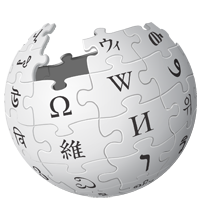I frequently use Wikipedia as a reference, particularly for breaking news. As a blogger, I link to supporting articles, because linked information adds depth.
broken links
I hate broken links, so I try to avoid linking to The Globe and Mail, for instance, because they started locking older articles behind a paywall. That deliberately breaks links that work when I post the article [unless the reader pays ransom].
I am quite certain that I’ve linked to Wikipedia more than any other website, and so I worry because deleted Wikipedia articles will result in broken links.
Broken links are bad for blogs, and while online news outlets often don’t understand this, Wikipedia ought to. As a blogger, when I link to something, I expect it to stay there. As an Internet user, it is annoying to follow a link to get more information, only to discover that the original article has been removed. The only time any Wikipedia entry should be deleted is if it is fraudulent.
The Wikipedia page Death of Mark Duggan is flagged for deletion. There is a huge argument raging about whether or not Mark Duggan’s death is notable.
I’ve never been to the UK, never met Mark Duggan in life.
Yet over here in Canada, I know Mark Duggan’s name, the tragic circumstances of his death, and the aftermath precipitated by it. People I talk to online are directly affected. It strikes me as absolutely ludicrous that this Wikipedia page might be deleted.
Wikipedia is “self-correcting;” which means if a contributor gets something wrong, other interested folks will step in and correct it. This has resulted in some surprisingly high levels of accuracy. Wikipedia is a creation of volunteers, so it isn’t perfect. It depends on co-operation. And unfortunately, as with any volunteer organization, internal politics exist. Which is why many perfectly good articles are deleted — because someone deems them unimportant.
And so the Death of Mark Duggan article is flagged for deletion: apparently, some Wikipedians claim it is not “notable.”
Call me crazy, but any event that precipitates days of rioting in a democracy seems worthy of note.
notable searches
The Google front page (citing: About 7,100,000 results (0.16 seconds) of a “Mark Duggan” search today turned up results starting with Tottenham & Wood Green Journal: ‘Why I clash with police’ by man who grew up with Mark Duggan and ends with the American ABC Television: What Happened to Mark Duggan, The Man Who Sparked the London Riots? This, in spite of the fact that the name, and page is also shared by a number of “established” people named Mark Duggan:
- Mark Duggan: Professor of Economics,
- Mark Duggan: Percussionist,
- Mark Duggan award winning artist
- Mark Duggan Photography,
- or the other Photographer named Mark Duggan
- and all the professionals named Mark Duggan listed in LinkedIn.
The Wikipedia article Death of Mark Duggan is the fifth listing, in itself an indication of “notability.”
A Bing/Yahoo search (citing “3,810,000 results”) results generates a page of search results entirely devoted to the dead young Tottenham man, with the “notable” Wikipedia article Death of Mark Duggan placing eighth.
limits
Back in the days when encyclopedia space was limited by the physical constraints of paper and ink and binding, notions of “notability” would have helped to determine what subjects to exclude. Not because the information was bad, but because the encyclopedia needed to appeal to enough people to be able to generate funds to pay for itself. Because what was considered notable to residents of one geographical area was not necessarily notable to others, different encyclopedias grew up in different countries.
Is the problem one of space? Is Wikipedia so close to capacity? The Wikipedia article Death of mark Duggan runs 1053 words, and the argument on the Wikipedia Wikipedia Articles for deletion: August 8th: Death of Mark Duggan runs 7425 as I write this. The argument for deletion takes up seven times as much space as the article flagged for deletion. This suggests any limitation based on space restrictions in today’s world of low cost digital storage would be artificial.
deletionism
There’s a page about the controversy Deletionism and inclusionism in Wikipedia. What it boils down to is some people want to limit the contents of Wikipedia based on the purely subjective basis of “notability.”
I know a few very active Wikipedians, but so far have only contributed a single Wikipedia page (relatively uncontroversial. largely untouched), which entitled me to attend a Wikipedia meeting at Toronto’s Linux Caffe that sought to determine interest in a possible Toronto Chapter. There was a lively discussion about “deletionists,” the consensus was opposed to wanton deletion, and many had stories about expert contributors who have ceased to contribute because of the deletion frenzy.
Writing a Wikipedia entry was hard work for me, not least because I had to learn the rules and the physical format.
It seems to me that anything that triggers the creation of a Wikipedia entry is “notable” to the contributor. Knowing that the hard work I might invest in future contributions could be deleted because someone else deems it not “notable” is a huge deterrent. Why should I bother? If I have information to share, I can blog it, because then I know it will still be available when someone needs the information a year from now. I don’t know that about Wikipedia. Investing time and energy in contributing to Wikipedia is one thing; having to spend time arguing why it shouldn’t be deleted is likely to drive away potential contributors. Destruction is always easier than creation.
censorship
Deletionism is a form of censorship exercised by some people who choose to impose their priorities on others.
While I defend your right to decide what is notable to you; I categorically reject your attempt to define what is notable or important to me. Is Wikipedia in the business of sharing information or censoring it?
If a Wikipedian doesn’t like an article, they needn’t visit it. However, if they manage to have articles deleted, others seeking the deleted information — people who would find it notable — will forever after be deprived of accessing the information.
I suggest that power struggles and bullying should have no place in Wikipedia.
subjective or objective?

I had the idea that Wikipedia aspires to be what I always imagined Asimov‘s Encyclopedia Galactica to be, a reference storehouse “containing all the knowledge accumulated” – which means including every fact.
Facts are facts. They are not good or bad, notable or not, until we apply our subjective biases.
In order to be a truly objective and comprehensive reference, Wikipedia must cease trying to decide what is important, because importance is variable.
If Wikipedia is to become a truly universal resource, it needs to dispense with any possibility of this kind of editorial censorship. History may be written by the victors, the bullies or the ruling class; but an encyclopedia should never be.
If it is true, if it exists, if it happened, it should be included in Wikipedia. What isn’t important today, might be tomorrow. Or next week.
A week ago, Mark Duggan was still alive. Today, his death has shaken the world.
Image Credit: Wikipedia © by Terry Foote & released under a Creative Commons Attribution 2.5 Generic License




[…] Dear Wikipedia: The Death of Mark Duggan is Notable […]
It’s not really classic deltionism vs inclusionism but lumping vs splitting. The information will end up in wikipedia somewhere the question is where.
It doesn’t really matter, because it boils down to internal politics where some Wikipedians are more interested in wielding personal power than in doing what is good for Wikipedia.
Notability is both relative and changable. The ultimate in misguided crystal ball gazing, not to mention hubris, is deciding what will be notable in the future.
[…] Dear Wikipedia: The Death of Mark Duggan is Notable I hate broken links, so I try to avoid linking to The Globe and Mail, for instance, because they started locking older articles behind a paywall. That deliberately breaks links that work when I post the article [unless the reader pays ransom]. […]
Nicely written as always Laurel. It’s a problem that Jimmy Wales has publicly admitted is driving contributors away from Wikipedia, and which could kill the project if not solved.
Wayne